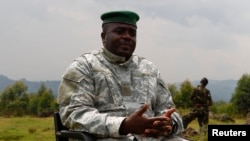NAIROBI —
The political head of the M23 rebel group in eastern Democratic Republic of Congo says its fighters are pulling back from their positions near the city of Goma, to allow for an investigation into the deadly shelling across the border into Rwanda. The rebels deny responsibility for the attack, which has raised tensions between Rwanda and the DRC.
M23 chief Bertrand Bisimwa told VOA rebel fighters started to withdraw from their positions in the town of Kanyaruchinya Friday morning - a day after the latest cross-border bombing.
He said the group also sent a letter to the United Nations, asking them to establish an investigation commission.
“We decided from this morning to withdraw our forces from Kanyaruchinya in order to give a chance to the commission in order to investigate on this matter,” he said.
The United Nations Security Council Thursday also called for an investigation by the Expanded Joint Verification Mechanism, a regional oversight team, into the source of recent shelling.
The Congolese Army blamed M23 rebels for Thursday’s incident, which Rwanda said killed a woman in the town of Rubavu.
The Rwandan government, in return, said Congolese forces were responsible for the attack, and for more than 30 other cross-border bombings in the past week.
In a statement, Rwanda’s Foreign Minister Louise Mushikiwabo called the shelling “unacceptable” and said Rwanda would “not hesitate to defend” its territory.
The Congolese Army and the U.N. regional peacekeeping force MONUSCO have kept up powerful attacks on M23 positions north of Goma for the past week, trying to push the rebels back from the city that they briefly occupied last year.
Bisimwa denied the decision to withdraw M23 forces had anything to do with that military pressure.
“There is no pressure on M23, but we understood that the government of Kinshasa and MONUSCO said that it (is) M23 who fired on Rwanda and on Goma and we want to establish the truth about this,” he said.
In terms of Rwanda’s potential involvement, Bisimwa said the conflict is between the Congo and M23, but he said Rwanda does have the right to protect its territory.
The United Nations and Congo, as well as several foreign nations and other organizations, have accused Rwanda of supporting the M23 rebels - a claim Rwanda has repeatedly denied.
M23 chief Bertrand Bisimwa told VOA rebel fighters started to withdraw from their positions in the town of Kanyaruchinya Friday morning - a day after the latest cross-border bombing.
He said the group also sent a letter to the United Nations, asking them to establish an investigation commission.
“We decided from this morning to withdraw our forces from Kanyaruchinya in order to give a chance to the commission in order to investigate on this matter,” he said.
The United Nations Security Council Thursday also called for an investigation by the Expanded Joint Verification Mechanism, a regional oversight team, into the source of recent shelling.
The Congolese Army blamed M23 rebels for Thursday’s incident, which Rwanda said killed a woman in the town of Rubavu.
The Rwandan government, in return, said Congolese forces were responsible for the attack, and for more than 30 other cross-border bombings in the past week.
In a statement, Rwanda’s Foreign Minister Louise Mushikiwabo called the shelling “unacceptable” and said Rwanda would “not hesitate to defend” its territory.
The Congolese Army and the U.N. regional peacekeeping force MONUSCO have kept up powerful attacks on M23 positions north of Goma for the past week, trying to push the rebels back from the city that they briefly occupied last year.
Bisimwa denied the decision to withdraw M23 forces had anything to do with that military pressure.
“There is no pressure on M23, but we understood that the government of Kinshasa and MONUSCO said that it (is) M23 who fired on Rwanda and on Goma and we want to establish the truth about this,” he said.
In terms of Rwanda’s potential involvement, Bisimwa said the conflict is between the Congo and M23, but he said Rwanda does have the right to protect its territory.
The United Nations and Congo, as well as several foreign nations and other organizations, have accused Rwanda of supporting the M23 rebels - a claim Rwanda has repeatedly denied.




